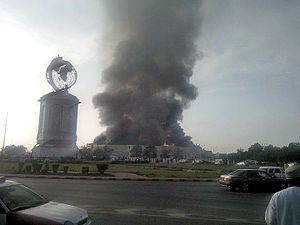2011 Omani protests
| 2011 Omani protests | |
|---|---|
| Part of the Arab Spring | |

Protesters set Sohar's Lulu Hypermarket ablaze on 28 February 2011.
|
|
| Date |
17 January 2011 – 8 April 2011
(2 months, 3 weeks and 1 day) |
| Location | |
| Goals |
|
| Methods | |
| Status | Ended |
| Casualties | |
| Death(s) | 2–6 |
| Injuries | 20 |
The 2011 Omani protests were a series of protests in the Persian Gulf country of Oman that occurred as part of the revolutionary wave popularly known as the "Arab Spring".
The protesters demanded salary increases, lower living costs, the creation of more jobs and a reduction in corruption. Protests in Sohar, Oman's fifth-largest city, centered on the Globe Roundabout. The Sultan's responses included the dismissal of a third of the governing cabinet.
Protesters demanded salary increases and lower costs of living. On 20 February 2011, protesters welcomed a move by the government to increase the minimum wage. The wage increase targets Omani workers in the private sector. Public sector Omani employees have received wage increases in the past, but the private sector was so far overlooked. The Government of Oman raised minimum wages for an estimated 150,000 private sector employees to $520 from $364 a month. As protests continued in Sohar the demands were still jobs and political reforms. The protesters also want more jobs, freedom of expression, less government control over the media, political reforms, better living conditions, an abolition of taxes and the trial of all ministers.
Protesters in Muscat also demanded cabinet ministers not serve more than four years. In several other protests, Omanis furthered their demands by calling for a reduction of foreign workers in order to provide more jobs for Omani citizens by private companies.
About 200 protesters marched on 17 January demanding salary increases and lower costs of living. The protest surprised international observers, who have viewed Oman as a "politically stable and sleepy country." Renewed protests termed as the Green March, occurred on 18 February, inspired by the serious unrest in fellow Gulf state Bahrain. 350 people marched, demanding an end to corruption and better distribution of oil revenue. The protesters also carried signs with slogans of support for the Sultan. Police did not intervene in the gathering, the petition calling for the reforms will be handed to Oman's Sultan Qaboos.
On 1 March, about 50 protesters held a sit-in as well outside the Consultative Assembly to demand political reform and an end to corruption. The group later grew to over 400 people. Protesters also continued to demand the Consultative Assembly be turned into a "real parliament." The protests were reported to be "peaceful, well-organised and very disciplined." Tents had been set up with separate accommodations for men and women. Placards with protest slogans had also been translated into English, French and German for the international media.
...
Wikipedia
